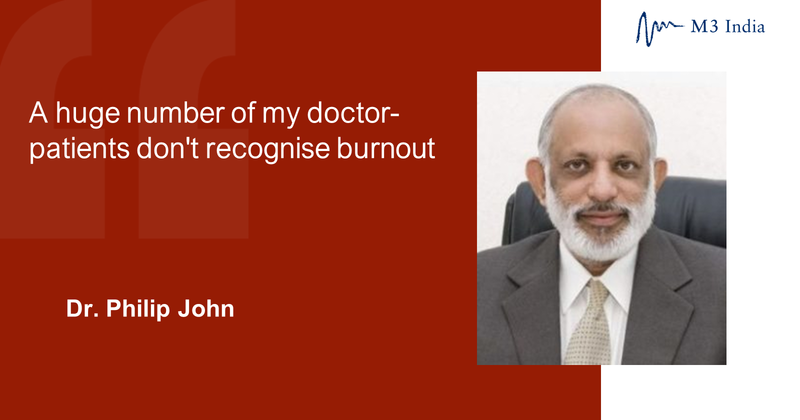A huge number of my doctor-patients don't recognise burnout: Dr. Philip John
M3 India Newsdesk Feb 28, 2019
Dr Philip John, a senior consultant psychiatrist from the prestigious NIMHANS speaks to M3 India about how doctors can deal with burnout

Prolonged work-related stress without proper intervention is a cause for emotional, mental, and physical exhaustion among healthcare professionals.
According to a study, titled "Burnout Syndrome Among Medical Practitioners Across India", doctors across the country are suffering from high levels of burnout. Twenty-five questions were asked to doctors to assess their mental and emotional well-being and satisfaction with job and life.
The study found that the longer a medical professional has served, the higher the level of exhaustion he/she experiences. Likewise, postgraduate doctors reported much higher burnout rate than graduates, illustrating that stress level increases with one's specialty level.
Some of the main findings of the survey were:
- 45.02 per cent participants reported emotional exhaustion
- 87.14 per cent scored low on the personal accomplishment scale
- 62.86 per cent had medium and 11.41 per cent had low scores on satisfaction with the medical practice
Tackling the tension
Dr Philip John, a senior consultant psychiatrist who holds an MD in psychiatry from the prestigious National Institute of Mental Health & Neurosciences (NIMHANS), is a recipient of Visakha Oration Award instituted by the Indian Psychiatric Society for outstanding contribution to psychiatry. He shares his advice on how doctors can deal with burnout.
Edited excerpts from the interview.
Do doctors acknowledge burnout?
Dr. John: I think doctors often fail to recognise that they are going through a burnout. If anhedonia starts affecting your performance and cognition, it’s not good for your work or for yourself. I use antidepressants, cognitive therapy and stress-busting techniques like exercise and medication on my patients. There is probably a stigma attached to doctors accepting burnout too. I have a huge number of doctor-patients today, mostly in their early-30s, who don't even recognise burnout.
And what are the symptoms of burnout among doctors?
Dr. John: When you lose pleasure in the little things of life, when it becomes mechanical when you experience some sense of burden in the morning when you set out for work, that is the first sign of burnout setting in.
Could you share some pointers for doctors to prevent or postpone burnout in their profession?
Dr. John: Today, the work of a doctor is becoming more mechanical. Whether it is a light specialty like psychiatry or a hard specialty like neurosurgery, we have to show light to patients and their families. An emotional passion is a must. If you combine the progress in medicine with the passion and emotion that you put into patients, you can postpone the advent of a burnout.
There is an emotional passion that we feel about what we do. If you're able to maintain this passion, it will reflect on the quality of work, your wanting to do this on a regular basis, again and again. That will persist because each day, each patient is a new experience. The repetitiveness that leads to boredom will disappear. So an emotional passion is a must. Further, hospitals should have a set-up only for doctors to get together for a cup of coffee during a break and it should not be monitored. This can be a great stress buster.
What are the main causes of burnout among doctors?
Dr. John: Some of the main causes are:
- Lack of social catharsis. The support system that doctors had earlier was a great sense of mutual gratitude, which is missing today. Media also has a role to play in this. There are thousands of surgeries happening on a given day, but only the one that went wrong is highlighted and it wipes out all that the medical community has done.
- Today, we are forced to practise “defensive medicine” and this hugely contributes to burnout among doctors. Patients are constantly googling for side-effects or for reasons why a medicine should not be consumed and that kills the gumption of a doctor. So the risk-benefit ratio cannot be applied to practice today at all because you do not know who is going to turn against you tomorrow. What patients don't understand is that information gives them knowledge but knowledge will not give them wisdom that comes from experience.
- The quality of food and time of intake is compromised because doctors’ routines are not under their control. Doctors need to take care of their own health first.
What are the recommended lifestyle changes doctors should adopt to avoid burnout?
Dr. John: A few lifestyle choices that doctors can easily adopt are:
- Always follow a passion out of your area of work. This will give a lot of fuel to go on without feeling burnout.
- When you step out of your clinic, do not take the residue of work back home. There has to be a certain level of “insulation” from the troubles of your work.
- A lot of us doctors do not even feel a sense of leisure. Take a day off at least once a week and travel outside the place of work.
- Have a routine of some exercise or yoga in the morning, or meditate.
- Apart from your family, it is very important to have a long-standing relationship with a friend or two whom you can trust completely. This catharsis is often not achievable at home because you talk to people in your family at a different level. These should be long-term friendships which are consistent and constant.
This article was originaly published on 27.4.18.
This interview is reported by Parvathy Jayakrishnan, a Bangalore-based freelance writer and a member of 101Reporters, a pan-India network of grassroots reporters.
-
Exclusive Write-ups & Webinars by KOLs
-
Daily Quiz by specialty
-
Paid Market Research Surveys
-
Case discussions, News & Journals' summaries